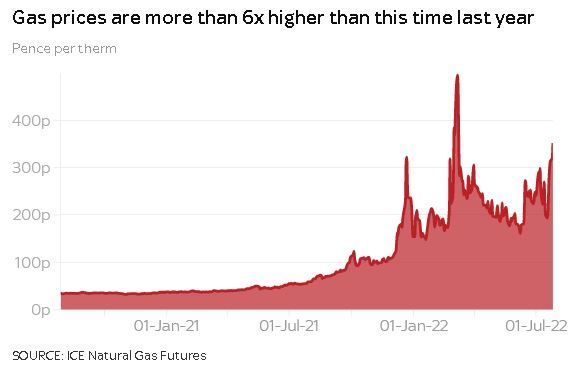
Cost of living: Energy price cap expected to double in January, experts warn
The energy price cap is now expected to double in January, hitting £3,850 per year, according to experts.
BFY Group, a utilities consultancy, said households could see energy bills of £500 for the month of January alone.
The cap is forecast
to rise to £3,420 in October - a much higher sum than the £2,800 predicted in May by Ofgem, the energy regulator.
Households are already paying £1,971 per year for energy bills after the price cap was increased in April - this would amount to a 74% increase in the autumn.
Cornwall Insight, another energy research specialist, had an even more stark prediction of £3,500 in October, with bills expected to stay above that level well into 2024.
The latest analysis takes into account the impact of Russia's decision to cut the flow of its gas to Europe to just 20% of the Nord Stream 1 pipeline's capacity, which has pushed up wholesale prices.
There are fears this will get even worse if Russia completely switches off supplies.
The UK imports less than 5% of its gas from Russia - and has pledged to phase out imports by the end of the year - but is impacted by fluctuations in the global markets.

The energy price cap used to be updated twice a year but will now be reviewed every three months.
It is based on the average cost of energy in the previous months.
Analysts say the picture could change by January, but they already have most of the data they need to accurately predict October's rise.
Based on typical consumption levels, households are expected to see bills of more than £250 for energy in October, more than £350 in November and more than £425 in December.
In February and March costs could reach more than £450 and £400 respectively.
The expected price cap rise in January would put more than half of British households in fuel poverty.
Until recently, a household was officially considered to be in fuel poverty if it spends more than 10% of its income on energy. The definition is still commonly used.
To avoid fuel poverty in January, a household would need to earn £38,500 - but the average after tax is just £31,400 per year.










